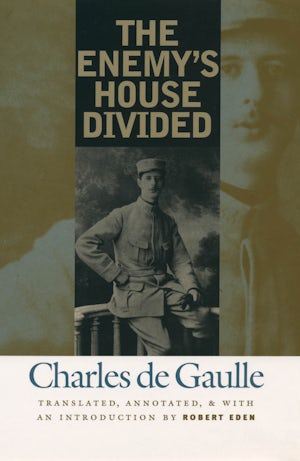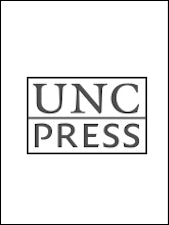The Enemy's House Divided
By Charles De Gaulle
Translated, annotated, and with an introduction by Robert Eden
232 pp., 6.125 x 9.25, 13 maps, appends., notes, index
-
Paperback ISBN: 978-1-4696-1462-5
Published: March 2014 -
E-book EPUB ISBN: 978-1-4696-2022-0
Published: March 2014 -
E-book PDF ISBN: 979-8-8908-7135-0
Published: March 2014
Buy this Book
- Paperback $37.50
- E-Book $19.99
For Professors:
Free E-Exam Copies
To de Gaulle, the German conduct of the Great War and the debacle of 1918 was the greatest moral disaster ever to befall a modern civilized political community. He seeks to identify the internecine causes of the collapse of the German war effort in 1918 and of the subsequent dissolution of the German Empire. His diagnosis of the profound moral crisis that unfolded in Germany during World War I points forward to 1940, for de Gaulle understood the fall of France, above all, as a moral catastrophe for the French. His first book, it is also a key document of de Gaulle's "philosophy of action," introducing his statesmanship to the world with its deliberate and studied critique of the perils of Nietzsche's philosophical initiative.
About the Author
Robert Eden is professor of political science at Hillsdale College in Hillsdale, Michigan, and author of Political Leadership and Nihilism: A Study of Weber and Nietzsche.
For more information about Charles De Gaulle, visit
the
Author
Page.
Reviews
"A fascinating study of the relationship between high command and social cohesion, strategic choice and political intrigue. The editor's excellent translation and even better introduction and notes make this lucid and penetrating book particularly worthwhile--a gift to those interested in one of the most intriguing soldier-statesmen of the past century."--Foreign Affairs
"Highly recommended. This first English translation will be of great interest to all levels of readership."--Choice
"Those interested in World War I and Charles de Gaulle should be grateful to Professor Robert Eden for his fine translation of de Gaulle's first book. . . . Deserves careful reading by those who want a fascinating look into the 'house of the enemy.'"--Journal of Military History
"De Gaulle was a talented writer and historian, so his first book --clearly translated by Robert Eden--makes enjoyable reading."--International History Review
"An indispensable document for studying the question of how a great leader comes into existence. . . . Thanks to the patient work of Robert Eden, the very beginning of de Gaulle's career as a moralist and a politician is now available to the English-reading public. . . . Also very valuable for the French scholar because of the detailed and thoughtful introduction."--Society
"De Gaulle's early masterpiece: a brilliant account of the internal divisions in Germany that led to its defeat in 1918, focusing on the flawed character of its leaders, on the civilian-military conflicts, and on morale. A book that informs about its subject and author, who had come to assess German affairs as a prisoner of war. A first translation of a work written nearly 80 years ago and still of profound interest."--Fritz Stern, Columbia University




